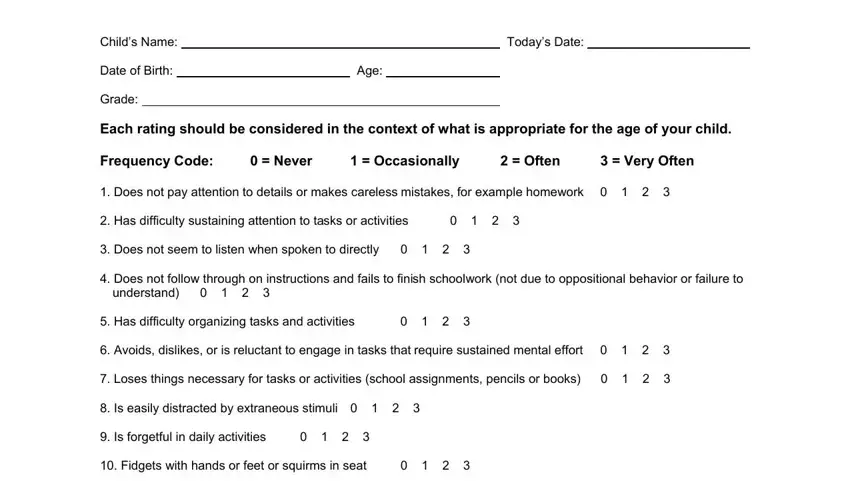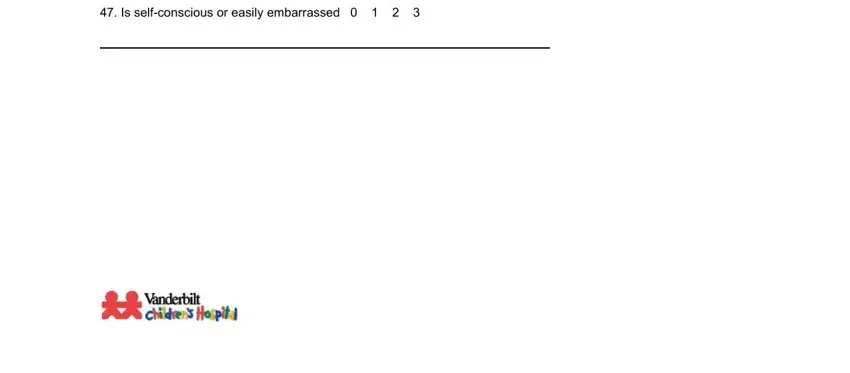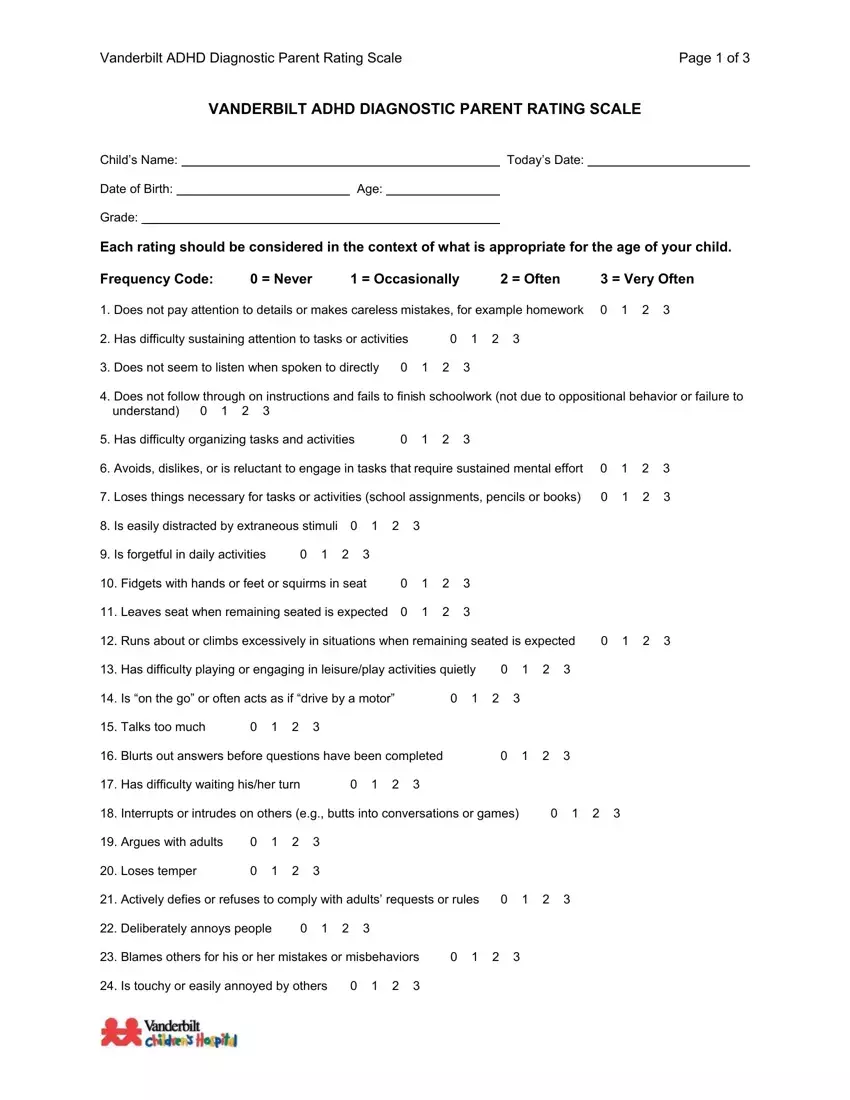Vanderbilt ADHD Diagnostic Parent Rating Scale |
Page 1 of 3 |
|
|
|
VANDERBILT ADHD DIAGNOSTIC PARENT RATING SCALE |
Child’s Name: |
|
|
|
Today’s Date: |
|
Date of Birth: |
|
|
Age: |
|
|
Grade: |
|
|
|
|
|
|
Each rating should be considered in the context of what is appropriate for the age of your child.
|
|
|
|
|
|
|
|
|
|
|
|
|
|
|
|
|
|
|
|
|
Frequency Code: |
0 = Never |
|
1 = Occasionally |
|
2 = Often |
|
3 = Very Often |
1. |
Does not pay attention to details or makes careless mistakes, for example homework |
0 |
1 |
2 |
3 |
2. |
Has difficulty sustaining attention to tasks or activities |
|
0 |
1 |
2 |
3 |
|
|
|
|
|
|
3. |
Does not seem to listen when spoken to directly |
0 |
1 |
2 |
3 |
|
|
|
|
|
|
|
|
4. |
Does not follow through on instructions and fails to finish schoolwork (not due to oppositional behavior or failure to |
|
understand) 0 1 |
2 |
3 |
|
|
|
|
|
|
|
|
|
|
|
|
|
|
|
|
5. |
Has difficulty organizing tasks and activities |
|
0 |
1 |
2 |
3 |
|
|
|
|
|
|
|
|
6. |
Avoids, dislikes, or is reluctant to engage in tasks that require sustained mental effort |
0 |
1 |
2 |
3 |
7. |
Loses things necessary for tasks or activities (school assignments, pencils or books) |
0 |
1 |
2 |
3 |
8. |
Is easily distracted by extraneous stimuli |
0 |
1 |
2 |
3 |
|
|
|
|
|
|
|
|
|
|
9. |
Is forgetful in daily activities |
0 |
1 |
2 |
3 |
|
|
|
|
|
|
|
|
|
|
|
|
10. |
Fidgets with hands or feet or squirms in seat |
0 |
1 |
2 |
3 |
|
|
|
|
|
|
|
|
11. |
Leaves seat when remaining seated is expected |
0 |
1 |
2 |
3 |
|
|
|
|
|
|
|
|
12. |
Runs about or climbs excessively in situations when remaining seated is expected |
0 |
1 |
2 |
3 |
13. |
Has difficulty playing or engaging in leisure/play activities quietly |
0 |
1 |
2 |
3 |
|
|
|
|
14. |
Is “on the go” or often acts as if “drive by a motor” |
|
0 |
1 |
2 |
3 |
|
|
|
|
|
|
15. |
Talks too much |
0 |
1 |
2 |
3 |
|
|
|
|
|
|
|
|
|
|
|
|
|
|
16. |
Blurts out answers before questions have been completed |
|
0 |
1 |
2 |
3 |
|
|
|
|
17. |
Has difficulty waiting his/her turn |
|
0 |
1 |
2 |
3 |
|
|
|
|
|
|
|
|
|
|
18. |
Interrupts or intrudes on others (e.g., butts into conversations or games) |
0 |
1 |
2 |
3 |
|
|
19. |
Argues with adults |
0 |
1 |
2 |
3 |
|
|
|
|
|
|
|
|
|
|
|
|
|
|
20. |
Loses temper |
0 |
1 |
2 |
3 |
|
|
|
|
|
|
|
|
|
|
|
|
|
|
21. |
Actively defies or refuses to comply with adults’ requests or rules |
0 |
1 |
2 |
3 |
|
|
|
|
22. |
Deliberately annoys people |
0 |
1 |
2 |
3 |
|
|
|
|
|
|
|
|
|
|
|
|
23. |
Blames others for his or her mistakes or misbehaviors |
0 |
1 |
2 |
3 |
|
|
|
|
|
|
24. |
Is touchy or easily annoyed by others |
0 |
1 |
2 |
3 |
|
|
|
|
|
|
|
|
|
|
Vanderbilt ADHD Diagnostic Parent Rating Scale |
Page 3 of 3 |
PERFORMANCE
|
Problematic |
Average |
Above Average |
1. Overall Academic Performance |
1 |
2 |
3 |
4 |
5 |
a. Reading |
1 |
2 |
3 |
4 |
5 |
b. Mathematics |
1 |
2 |
3 |
4 |
5 |
c. Written Expression |
1 |
2 |
3 |
4 |
5 |
PERFORMANCE
|
Problematic |
Average |
Above Average |
2. Overall Classroom Behavior |
1 |
2 |
3 |
4 |
5 |
a. Relationship with peers |
1 |
2 |
3 |
4 |
5 |
b. Following Directions/Rules |
1 |
2 |
3 |
4 |
5 |
c. Disrupting Class |
1 |
2 |
3 |
4 |
5 |
d. Assignment Completion |
1 |
2 |
3 |
4 |
5 |
e. Organizational Skills |
1 |
2 |
3 |
4 |
5 |
Scoring Instructions for the ADTRS
*Predominately inattentive subtype requires 6 or 9 behaviors, (scores of 2 or 3 are positive) on items 1 through 9, and a performance problem (scores of 1 or 2) in any of the items on the performance section.
*Predominately hyperactive/Impulsive subtype requires 6 or 9 behaviors (scores of 2 or 3 are positive) on items 10 through 18 and a problem (scores of 1 or 2) in any of the items on the performance section.
*The Combined Subtype requires the above criteria on both inattention and hyperactivity/impulsivity.
*Oppositional-defiant disorder is screened by 4 of 8 behaviors, (scores of 2 or 3 are positive) (19 through 26).
*Conduct disorder is screened by 3 of 15 behaviors, (scores of 2 or 3 are positive) (27 through 40).
*Anxiety or depression are screened by behaviors 41 through 47, scores of 3 of 7 are required, (scores of 2 or 3 are positive).






